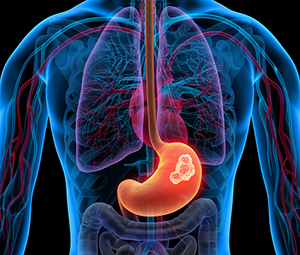In an individual patient data meta-analysis reported in the Journal of Clinical Oncology, Pietrantonio et al found that microsatellite instability (MSI) status was a strong prognostic marker in patients with resectable gastric cancer.

Photo credit: Getty
The study involved data from 1,556 patients with resectable gastric cancer and available MSI information from the CLASSIC (n = 592), MAGIC (n = 317), ARTIST (n = 388), and ITACA-S (n = 259) trials. Multivariate analysis was performed in the MAGIC and CLASSIC trial populations to assess interaction of treatment (chemotherapy plus surgery or surgery alone) with MSI.
MSI Status and Outcomes
Among the 1,556 patients with known MSI status, 121 (7.8%) had MSI-high tumors. For patients with MSI-high tumors vs patients with MSI-low/microsatellite stable (MSS) tumors, 5-year disease-free survival was 71.8% vs 52.3% (P < .001) and 5-year overall survival was 77.5% vs 59.3% (P < .001).
In the multivariate analyses, MSI status was independently associated with disease-free survival and overall survival, with hazard ratios (HRs) for MSS/MSI-low vs MSI-high status of 1.88 (P < .001) and 1.78 (P = .008), respectively. Other factors significantly associated with disease-free and overall survival included ethnicity (worse outcomes among European [n = 576] vs Asian patients [n = 980]), T and N stage, treatment group (worse outcomes among patients receiving surgery alone), and sex (worse overall survival in men).
KEY POINTS
- Among all patients, MSI-high status was associated with better disease-free and overall survival.
- In multivariate analysis, patients with MSI-low/MSS tumors—but not those with MSI-high tumors—benefited from chemotherapy plus surgery vs surgery alone.
Patients with MSI-low/MSS disease had better outcomes with chemotherapy plus surgery vs surgery alone, with 5-year disease-free survival rates of 57% vs 41% (HR = 0.65, 95% confidence interval [CI] = 0.53-0.79) and 5-year overall survival of 62% vs 53% (HR = 0.75, 95% CI = 0.60 to 0.94). Patients with MSI-high disease did not exhibit benefit of chemotherapy plus surgery vs surgery alone, with 5-year disease-free survival of 70% vs 77% (HR = 1.27, 95% CI = 0.53–3.04) and 5-year overall survival of 75% vs 83% (HR = 1.50, 95% CI = 0.55–4.12).
The investigators concluded, “In patients with resectable primary [gastric cancer], MSI is a robust prognostic marker that should be adopted as a stratification factor by clinical trials. Chemotherapy omission and/or immune checkpoint blockade should be investigated prospectively in MSI-high [gastric cancers], according to clinically and pathologically defined risk of relapse.”
Elizabeth C. Smyth, MD, of Cambridge University Hospitals NHS Foundation Trust, is the corresponding author for the Journal of Clinical Oncology article.
Disclosure: For full disclosures of the study authors, visit jco.ascopubs.org.

